
Seasoning is the process of supplementing food via herbs, spices, salts, and/or sugar, intended to enhance a particular flavour.
Albanian cuisine is a representative of the cuisine of the Mediterranean. It is also an example of the Mediterranean diet based on the importance of olive oil, fruits, vegetables and fish. The cooking traditions of the Albanian people are diverse in consequence of the environmental factors that are more importantly suitable for the cultivation of nearly every kind of herbs, vegetables and fruits. Olive oil is the most ancient and commonly used vegetable fat in Albanian cooking, produced since antiquity throughout the country particularly along the coasts.
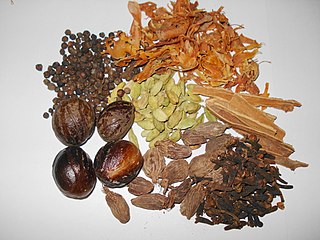
Spice mixes are blended spices or herbs. When a certain combination of herbs or spices is called for in a recipe, it is convenient to blend these ingredients beforehand. Blends such as chili powder, curry powder, herbes de Provence, garlic salt, and other seasoned salts are traditionally sold pre-made by grocers, and sometimes baking blends such as pumpkin pie spice are also available. These spice mixes are also easily made by the home cook for later use.

Hot sauce is a type of condiment, seasoning, or salsa made from chili peppers and other ingredients. Many commercial varieties of mass-produced hot sauce exist.

Adobo or adobar is the immersion of cooked food in a stock composed variously of paprika, oregano, salt, garlic, and vinegar to preserve and enhance its flavor. The Portuguese variant is known as carne de vinha d'alhos. The practice, native to Iberia, was widely adopted in Latin America, as well as Spanish and Portuguese colonies in Africa and Asia.

Lawry's and Adolph's are food, seasoning, and beverage brands owned by McCormick & Company, and formerly owned by Unilever and Lawry's. Products include marinades, spice blends, breadings, Spatini sauce, and other seasoning mixes.
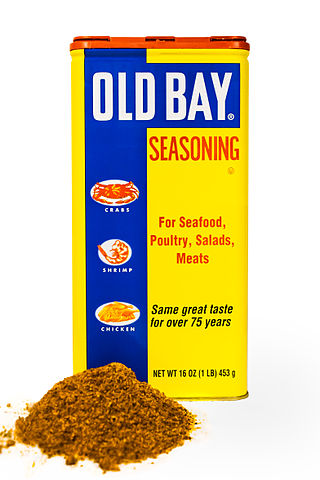
Old Bay Seasoning is a blend of herbs and spices that is marketed in the United States by McCormick & Company and originally created in Baltimore, Maryland.

Onion powder is dehydrated, ground onion that is commonly used as a seasoning. It is a common ingredient in seasoned salt and spice mixes, such as beau monde seasoning. Some varieties are prepared using toasted onion. White, yellow and red onions may be used. Onion powder is a commercially prepared food product that has several culinary uses. Onion powder can also be homemade.

Fruit curd is a dessert spread and topping usually made with citrus fruit, such as lemon, lime, orange, grapefruit or tangerine. Other flavor variations include passion fruit, mango, and berries such as raspberries, cranberries or blackberries.
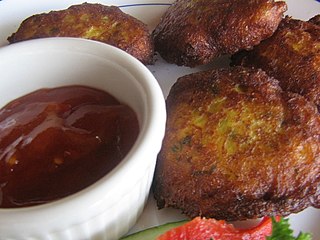
Chili sauce and chili paste are condiments prepared with chili peppers.

A crab boil is a social event where boiled crabs are eaten, a kind of seafood boil.

Mrs. Dash is an American brand of salt-free seasoning that was introduced in 1983 and was marketed by B&G Foods. The best known varieties of Mrs. Dash are granulated mixtures of dried herbs and spices which are sold in small plastic shaker bottles holding 2.5 oz of product, 1.25 oz packets, for seasoning a 'family-size' meal, and .02 oz single-serving packets for consumers and institutional use, e.g. for patients on sodium-restricted diets.

Many cuisines feature eggplant salads and appetizers.
The following outline is provided as an overview of and topical guide to herbs and spices:

Popcorn seasoning is any ingredient used to add flavor to popcorn. In the United States, popcorn seasoning is mass-produced by several companies for commercial and consumer use. Popcorn seasonings may be used to enhance the flavor of popcorn, and some are used to add a buttery flavor to popcorn. Significant amounts are often used to ensure the adequate flavoring of popcorn, due to popcorn's low density. It is also sometimes utilized to add coloring to popcorn. Some popcorn seasoning may contain monosodium glutamate. Some specialty products exist in unique flavors, such as chocolate and bubble gum. Some popcorn seasoning products may be referred to as popcorn salt.
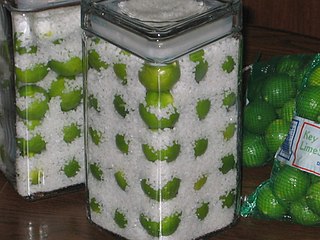
Pickled fruit refers to fruit that has been pickled. Pickling is the process of food preservation by either anaerobic fermentation in brine or immersion in vinegar. Many types of fruit are pickled. Some examples include peaches, apples, crabapples, pears, plums, grapes, currants, tomatoes and olives. Vinegar may also be prepared from fruit, such as apple cider vinegar.
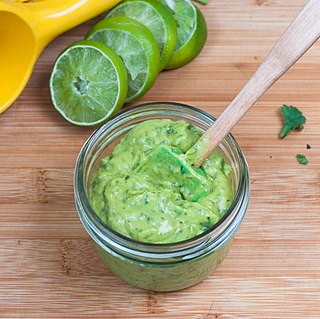
Avocado sauce is a sauce prepared using avocado as a primary ingredient. Commercial sauces are typically prepared to have a thin, sauce-like consistency that is pourable. Commercial preparation involves mixing the avocado using high-speed blenders, which breaks up the pulp. Spices, water and emulsifiers are added, and the resultant product is then typically frozen to prevent browning. Popular brands include Kumana and Herdez.















